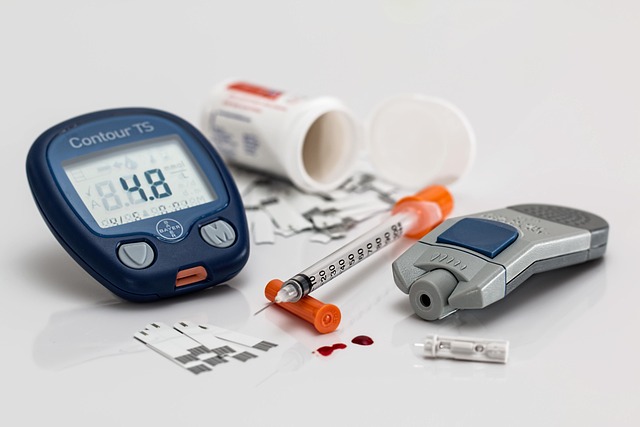UK Cholesterol Blood Tests are key for gauging heart health, monitoring LDL ('bad') and HDL ('good') cholesterol levels, and identifying silent risk factors for cardiovascular diseases. Ideal total cholesterol is below 5.2 mmol/L (190 mg/dL), with borderline high levels between 5.2-6.2 mmol/L (190-230 mg/dL). Regular tests through local pharmacies empower individuals to proactively manage their heart health, interpreting results and taking appropriate action with the help of healthcare professionals.
Cholesterol is a waxy substance found in our blood, essential for various bodily functions. However, high cholesterol levels can lead to health issues. This article explores the significance of cholesterol level testing through blood tests, offering insights into what these tests entail and how they help manage your health. We’ll delve into understanding cholesterol levels and their implications, highlighting the role of UK cholesterol blood tests as a crucial tool for monitoring and maintaining optimal cholesterol levels.
- Understanding Cholesterol Levels: What Do They Mean?
- How Blood Tests Help Monitor Cholesterol
- UK Cholesterol Blood Test: Availability and Next Steps
Understanding Cholesterol Levels: What Do They Mean?
Cholesterol levels are a crucial indicator of heart health, and understanding what they mean is essential for anyone considering a UK cholesterol blood test. Total cholesterol is measured in milligrammes per decilitre (mg/dL), and results are categorised into broad ranges. Ideally, total cholesterol should be below 5.2 mmol/L (190 mg/dL). However, levels between 5.2 to 6.2 mmol/L (190-230 mg/dL) are considered borderline high, while anything above 6.2 mmol/L (230 mg/dL) is a cause for concern.
High cholesterol can be a silent risk factor for cardiovascular diseases, so a UK cholesterol blood test is a proactive step towards maintaining heart health. Different types of cholesterol, such as LDL (low-density lipoprotein) and HDL (high-density lipoprotein), also play significant roles. LDL cholesterol, often referred to as ‘bad’ cholesterol, can build up in the arteries and increase the risk of heart disease. On the other hand, HDL cholesterol, or ‘good’ cholesterol, helps remove LDL from the bloodstream, thereby reducing cardiovascular risks.
How Blood Tests Help Monitor Cholesterol
Blood tests are a crucial tool in monitoring cholesterol levels, offering a direct way to assess your cardiovascular health. In the UK, cholesterol blood tests provide essential insights into the types and amounts of cholesterol present in your blood. These tests typically measure low-density lipoprotein (LDL) cholesterol, often referred to as ‘bad’ cholesterol, and high-density lipoprotein (HDL) cholesterol, known as ‘good’ cholesterol. The results help healthcare professionals determine an individual’s risk for heart disease and stroke, allowing for proactive measures to manage cholesterol levels.
By analysing a small sample of your blood, these tests can reveal critical information about your lipid profile. High LDL cholesterol levels are associated with an increased risk of plaque buildup in the arteries, while HDL cholesterol helps remove excess cholesterol from the bloodstream. Regular UK cholesterol blood tests enable individuals to take charge of their health by identifying potential issues early on and guiding lifestyle changes or medical interventions to maintain optimal cholesterol levels.
UK Cholesterol Blood Test: Availability and Next Steps
In the UK, cholesterol level testing through blood tests is readily available and accessible to the general public. Many local pharmacies offer this service, providing a convenient and often affordable way for individuals to monitor their cholesterol health. The process typically involves a simple finger prick or venous blood sample taken by qualified staff. Results are usually available within a few days, offering valuable insights into an individual’s cardiovascular risk.
Upon receiving your UK Cholesterol Blood Test results, the next steps involve understanding and acting upon them. If cholesterol levels are high, it’s recommended to consult with a healthcare professional who can provide personalized advice on lifestyle changes or, if necessary, prescribe medication to help manage cholesterol. Regular follow-up tests can then be scheduled to track progress and ensure levels remain within healthy ranges.
Cholesterol level testing through blood tests, like the UK Cholesterol Blood Test, is a crucial step in managing your heart health. By understanding your cholesterol levels and how to interpret them, you can take proactive steps towards a healthier lifestyle. Regular monitoring, made accessible through readily available UK Cholesterol Blood Tests, empowers individuals to make informed decisions and navigate their way to better cardiovascular health.
